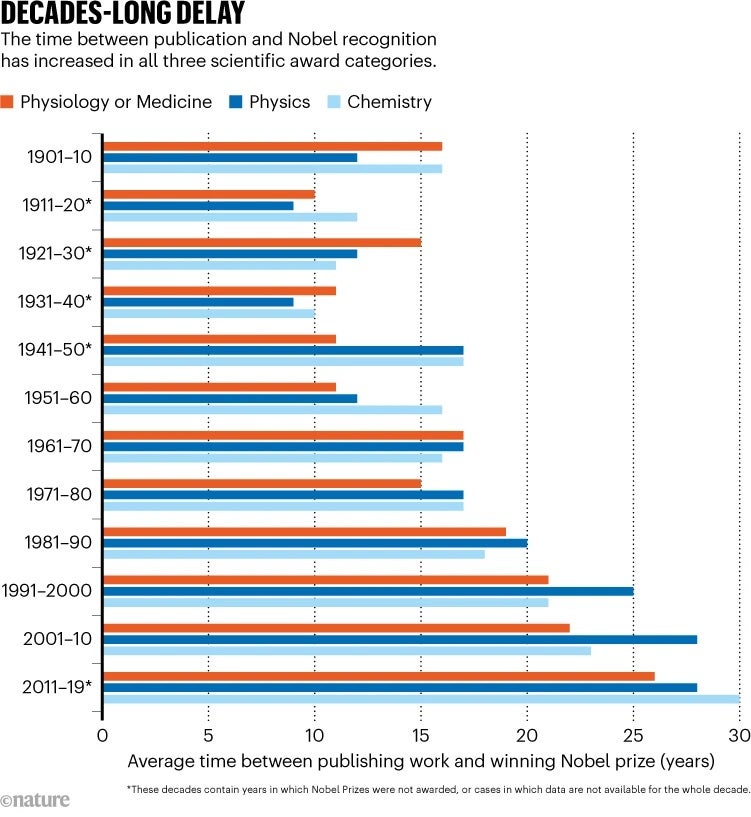[ad_1]
The highway to a Nobel Prize, the most prestigious scientific award in the earth, is rising ever extended, with nearly 50 percent of laureates now waiting around additional than 20 a long time from creating a Nobel-deserving discovery to getting the prize.
Just one investigation reveals that the regular time amongst publishing the get the job done and getting 1 of the science prizes has almost doubled in the earlier 60 yrs. Throughout the 3 science prizes, chemistry now has the longest ‘Nobel lag’ — an typical of 30 several years about the earlier decade — and physiology or medicine has the shortest, at 26 several years (see ‘Decades-extended delay’).
 

Alfred Nobel’s will mentioned that the prizes should really be awarded “to these who, throughout the preceding 12 months, shall have conferred the best profit to mankind.” In truth this has only took place a couple of instances. But in the very first 50 percent of the twentieth century, it was widespread for Nobel prize recipients to be in their 30s — and that is unheard of now, says Santo Fortunato, now a computational social scientist at Indiana University in Bloomington, who printed a 2014 examination on Nobel prizewinners due to the fact the award’s conception in 1901. His outcomes showed that the time amongst laureates’ prize-profitable exploration and their Nobel had bit by bit increased over the many years, with a steeper slope just after the 1960s than in the early a long time of the prize.
There are a number of possible causes for this trend, says Yian Yin, a computational social scientist at Cornell University in Ithaca, New York. It could be that the general variety of breakthroughs is rising just about every year, so awards cannot hold up with the selection of persons who ought to have to be acknowledged, he says. It is also the situation that the great importance of some operates, which Yin describes as ‘sleeping beauties,’ are only recognized decades or a long time later.
Alternatively, the lengthening gap could be a indicator that there has been a reduce in ‘disruptive’ science — crucial experiments or discoveries that improve the paradigm of their field. This could be triggering the Nobel committees to concentration additional on the earlier.
The number of ‘big-splash’ discoveries are diminishing, but when they do come about, they have a tendency to get recognized quickly, claims Fortunato. For case in point, biochemists Jennifer Doudna at the University of California, Berkeley and Emmanuelle Charpentier at the Max Planck Unit for the Science of Pathogens in Berlin, won the 2020 Nobel Prize in Chemistry just eight several years soon after their growth of the CRISPR–Cas9 technique as a genome-editing instrument. Some scientists speculate that the inventors of mRNA vaccines, which were rolled out to hundreds of thousands of persons all over the world all through the COVID-19 pandemic, could get similar recognition.
Fortunato details out that, if the gap continues to develop, notable scientists could pass up out on the award owing to the Nobel Committee’s rule banning posthumous prizes (with the exception of the 2011 Nobel Prize in Physiology or Medicine, a share of which was awarded to medical doctor Ralph Steinman, who had handed absent a few times just before the announcement, unbeknownst to the committee). “It has to end at some position,” he states, incorporating that a rethink of the posthumous-awarding ban would allow for much more people’s work to get the recognition that it deserves.
This article is reproduced with authorization and was to start with published on September 29, 2023.
[ad_2]
Supply connection






